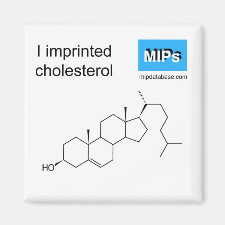
Authors: Tong YJ, Guan HM, Wang SF, Xu JW, He CB
Article Title: Syntheses of chitin-based imprinting polymers and their binding properties for cholesterol.
Publication date: 2011
Journal: Carbohydrate Research
Volume: 346
Issue: (4)
Page numbers: 495-500.
DOI: 10.1016/j.carres.2010.12.013
Alternative URL: http://www.sciencedirect.com/science/article/B6TFF-51SWG50-1/2/0456eb2ac25827e550a2f8f9ab5ff983
Abstract: A novel chitin derivative, cholesteryl chitin carbonate (Chitin-Chol), was synthesized from chitin and cholesteryl chloroformate. This product was characterized by Fourier transform infrared (FTIR) spectroscopy and solid-state 13C nuclear magnetic resonance (13C NMR), and was used as a covalently bound template precursor for imprinting cholesterol. After cross-linking with toluene 2,4-diisocyanate, it was efficiently cleaved hydrolytically to afford a guest-binding site accompanying the easy and efficient removal of a sacrificial spacer. The selectivity and efficacy of a chitin-based imprinting polymer for steroid binding were assessed by a chromatographic screening process. The results of binding experiments showed that this molecular imprinting polymer (MIP) has a high binding capacity with cholesterol. The target discrimination towards cholesterol over its close structural analogue suggested that the polymer recognition site was possible on the basis of the inversion of configuration of a single hydroxyl group. In addition, non-covalent imprinting was done using chitin as a precursor and its binding properties for cholesterol were also evaluated
Template and target information: cholesterol, cholesteryl chitin carbonate
Author keywords: Cholesteryl chitin carbonate, cholesterol, sacrificial spacer method, non-covalent imprinting



Join the Society for Molecular Imprinting

New items RSS feed
Sign-up for e-mail updates:
Choose between receiving an occasional newsletter or more frequent e-mail alerts.
Click here to go to the sign-up page.
Is your name elemental or peptidic? Enter your name and find out by clicking either of the buttons below!
Other products you may like:
 MIPdatabase
MIPdatabase









